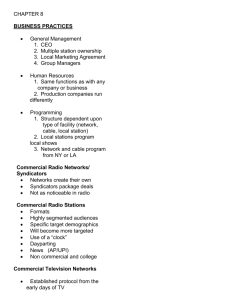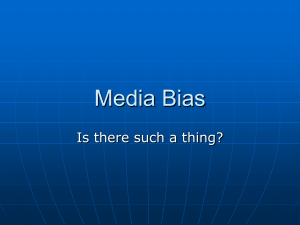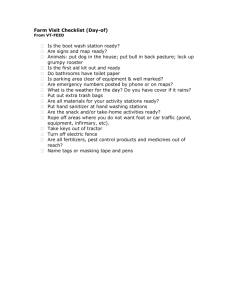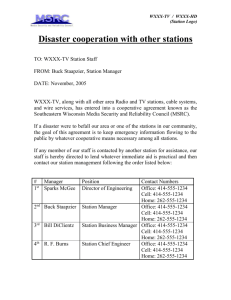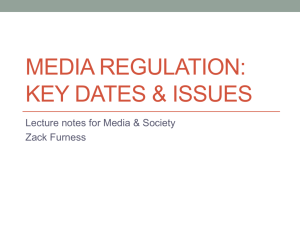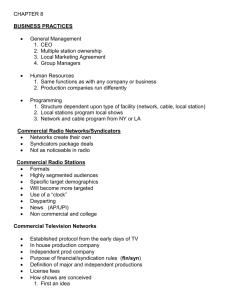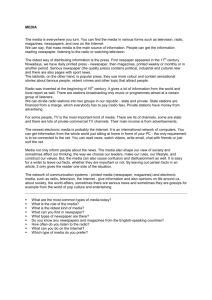Media Ownership in the United States
advertisement
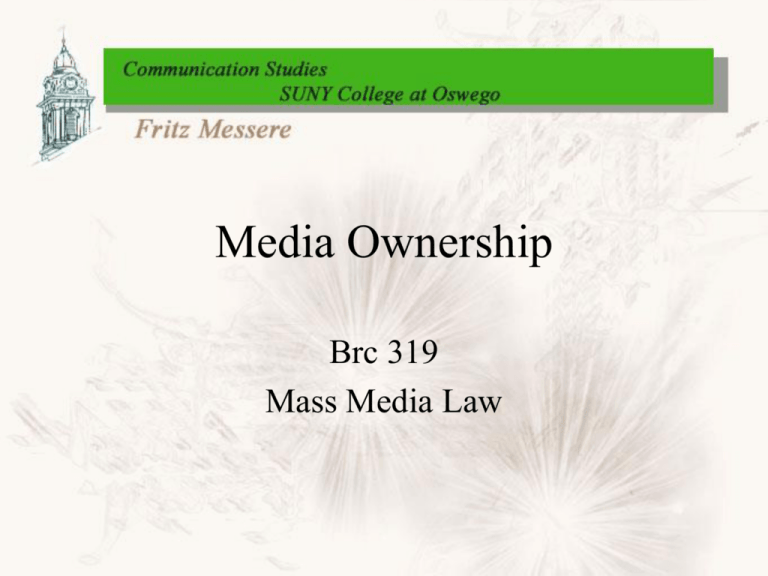
Media Ownership Brc 319 Mass Media Law Media Ownership in the United States * Two Forms Non Regulated - Newspapers, Magazines, Internet Regulated - Television, Radio and Cable (to some extent) * The Federal Communications Commission Licenses Radio and Television Stations * It Regulates Cable Rates if authorized by Congress The Airwaves Belong to the People * Unlike most countries where the government asserts ownership of the airwaves, the United States Congress said that the airwaves belong to the public. This notion is really an extension of our First Amendment rights Why Regulate Radio and TV Stations? * The Radio Act of 1912 made it necessary for operators of stations to get a license to use the ‘ether’(airwaves) * The ‘ether’ (airwaves) are thought to be a finite resource Who should get a license? What level of service should be provided? * Licenses should be given to those who would provide the best service to the community * The ‘test of service’ is the “public interest, convenience and necessity.” Media Ownership should be localized * Local stations should program to local audiences. In the U.S. that means local programs in addition to national (network) programs Media Ownership has always been limited * The basis of the First Amendment is that anyone who wishes to speak and publish should be able to do so * Early on the FCC decided that too much concentrated media ownership could limit the number of voices that could speak * Each and every station had to be re-licensed every 3 years - Test of service Media Ownership has always been limited * Until 1985, radio and television station ownership was very limited. Broadcasters could own: 7 Television stations 7 AM 7 FM stations Broadcasters could only own one type of station in each market. Media Ownership has always been limited * Cross media ownership with television and newspapers in most markets was forbidden For example, in 1975 the FCC said that a television station could not be owned by the same company that owned the local newspaper Media Ownership Rules 1985 - 1996 * FCC Relaxed Rules during this period to help consolidate the radio industry. * Television ownership was still limited to about 12 stations (up to 25% of U.S. population) The Telecommunications Act of 1996 * Watershed legislation that ordered the FCC to loosen restrictions on broadcast ownership Group Station owners could own as many stations as they pleased, restricted in numbers by markets. For example, in radio: In small markets, owners could own up to 5 stations In larger markets, owners could own up to 8 stations Local Radio Changed Dramatically * In 1995, Clear Channel Communications owned 54 radio stations * In 2003, Clear Channel owns 1,240 radio stations (about 10% of all commercial stations) Source: Broadcasting, Cable, the Internet and Beyond - Dominick, Messere, Sherman (2003) Local Radio Changed Dramatically * 1995: In Syracuse, no one owner could own more than 2 radio stations (1 AM & 1 FM) * 2003, Clear Channel owns 8 radio stations including the most powerful AM and FM stations in the market Some of the stations in the area owned by Clear Channel Communications Rochester WHAM-AM WHTK-AM WKGS-FM WLCL-FM WMAX-FM WNVE-FM WVOR-FM Syracuse Utica WBBS-FM WADR-AM WHEN-AM WOUR-FM WYYY-FM WRFM-FM WSYR-AM WSKS-FM WHHT-FM WUTQ-AM WSKU WRBY-FM WWDG-FM WPHR- FM (Auburn) Sources: Columbia Journalism Review and CNYRadio.com Local Radio Changed Dramatically * 1995: In Oswego and Fulton there were 2 AM and 3 FM stations, all with different local programming (Swap Shop, Speedway program, Local Weather with Bob Sikes, Laker Hockey) Local Radio Today * 2003, except for WAMF 1300 AM, Fulton, all local stations are gone. Now all Oswego, Minneto and Fulton stations simply rebroadcast other Syracuse stations Are Television Rules About to Change? * In 2001, the FCC began evaluating televisionnewspaper cross ownership, dual network, local and national television ownership rules Are Television Rules About to Change? * Early in 2003, FCC Chairman, Michael Powell signaled a desire to relax restrictions on television ownership. •Increasingly the Courts have taken issue with FCC rulemaking, frequently calling the decisionmaking ‘arbitrary and capricious.’ (Look at the Sinclair case) Proposed Changes in Media Ownership Proposed Changes in Media Ownership * Proposed changes are concerned more with television stations and newspaper ownership rules Proposed Changes in Media Ownership * National TV Ownership Caps (for group owners) Current Rule: Set for 35% of the 106.7 million TV households Proposed Rule: Would raise ceiling to 45% of the TV households - Congress modified it to 39%in 2004 Proposed Changes in Media Ownership * Newspaper Crossownership Current Rule: Forbidden for newspaper and television station ownership in the same market Proposed Rule: Permit crossownerhip in the top 150 markets Proposed Changes in Media Ownership * TV Duopoly Current Rule: Permitted only in the largest 50 markets where there are 8 separately owned TV stations Proposed Rule: Prohibit duopolies between any market’s 4 top rated stations but permitted for larger/smaller station combinations Proposed Changes in Media Ownership * TV Triopolies Current Rule: Completely forbidden Proposed Rule: Allow triopolies in markets with 18 TV stations, roughly the top markets in the country Who Favors The Proposed Rules? * Television Networks favor raising the media ownership caps from 35% to 45% Most TV Networks lose money TV Networks make money on the stations they own. If they can ‘reach’ 45% of the population with their own stations, they can offset losses in the network portion of the business Who Favors The Proposed Rules? * Newspapers favor changing the newspaper crossownership rules Newspapers argue that as the younger population gets more news from TV than from print. In order to stay strong, crossownership would permit newspapers and TV stations to share reporters, equipment, etc Who Favors The Proposed Rules? * Television group owners favor changing the duopoly rules Television group owners in small markets have seen audience shrinkage as more people turn away from TV and watch cable. Owning more than one station in the market would allow for economies of scale Who Favored The Proposed Rules? * Television networks favor the changes in the rules allowing triopolies TV Networks (mostly) own other outlets and this additional outlets would allow them to ‘sell’ different audiences to advertisers. Economies of scale would be a factor. Who Opposed the Rules? * Center for Digital Democracy, Media Access Project, Common Cause, Communication Workers of America, Writer’s Guild, Screen Actors Guild, National Rifle Association, Parents Television Council, Catholic Conference, Association of Christian Schools, Media Alliance, Directors Guild of America, Code Pink and many other groups Why Do The Rules Change Matter? Why Do The Rules Change Matter? *Victoria Riskin - President of Writers Guild of America, west “ In 1992, only 15% of new TV series were produced by networks. Today that figure is 77%…. The 6 media companies that own the TV networks also own or co-own 80% of all the major cable networks.” Why Do The Rules Change Matter? * Ted Turner - Founder of CNN and Superstation WTBS “The days of starting up a cable television network or trying to do it from outside the media business are over….there’s really five companies that control 90% of what we read, see and hear.” Why Do The Rules Change Matter? *William Safire writing an Op Ed in the New York Times “We’ve already seen what happened when the FCC allowed the monopolization of local radio: today three companies own half the stations in America, delivering homogenized product that neglects local news coverage and dictates music sales.” Why Do The Rules Change Matter? *P.J. Bednarski, Editor of Broadcasting and Cable Magazine: “The rules…the FCC propose to change don’t just let companies get bigger. They effectively prevent new entrants…” Why Do The Rules Change Matter? *Michael Copps, FCC Commissioner, dissenting the decision “At issue is whether a few corporations will be ceded gatekeeper control over the civil dialogue of our country, content control over our music, entertainment and information…” Where do the rules stand? *June 2, 2003, the FCC passed all the rule changes in a 3 to 2 vote, along party lines. 3 Republicans voted in favor of the rules 2 Democrats voted against the rule changes Public Interest Concerns * The Commission needs to examine decisions in light of the ‘public interest’ standard as required in the laws that govern media regulation. Public Interest Concerns * In this proceeding more than 700,000 comments were filed with the FCC before the vote. Ninety percent of those comments opposed changing the rules. Should one ask in who’s public interest did the FCC vote? Update on Current Situation The Rules were voted and passed by the FCC but a court challenge by Prometheus Radio and the Media Access Project caused the 3rd Circuit to revoke the rules

